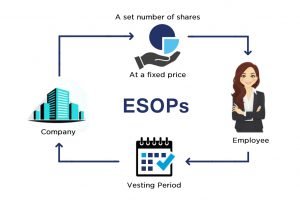The fast-advancing work culture demands a competitive skill set for working candidates to sustain. This talented workforce comes with high expectations of employee compensation and benefits. Gone are the days when companies could sustain talent merely by crediting salaries and bonuses. The CTC expanded its horizons and made space for new ways of compensation, like the ESOP (Employee Stock Option Plan).
What is an ESOP(Employee Stock Options Plan)
In many cases, when a person joins a company, in addition to their salary, they get a share in the company’s equity, called ESOPs. ESOPs are a reward for stellar performance and employee efforts. When a company grants ESOPs, it infuses the spirit of ownership which directly translates into longevity and retention of the workforce.
How do ESOPs work
Most companies usually keep their ESOPs pool worth 2-7% of their total shareholding. When ESOPs are issued, the employee has to stay with the organisation for a specific period to exercise the ESOP and convert it into shares. The waiting time is called the vesting period. In most cases, the vesting period is 3-4 years, after which the employee is free to encash the holdings. Along with income tax, ESOPs also attract a 10% LTCG if the capital gains exceed the profit of 1 lakh.

ESOPs from an employees outlook
After being rewarded with ESOPs, a sense of ownership gets inculcated among the employees. Their goals align with the company’s vision, which reflects in the company’s performance. FAANG(Facebook, Amazon, Apple, Netflix, and Google)companies like Google have been the exemplar of ESOP giving companies. During their IPO launch, 1000s of Google employees became millionaires along with the commendable success of the company.
Another epic story was Freshworks’ IPO, which quickly became the talk of the town when 500+ ESOP granted employees earned more than one crore in a day. Freshworks, in 2016, was valued at around $500 million. The same company, in 2021, got listed on the stock exchange at $12 billion.
The ESOP culture started in India in 1981, with Infosys being the first Indian company to give out ESOPs. Today, startups like Paytm, Nykaa, Cred, Meesho, Zomato, etc, are also well known for issuing ESOPs. Recently, One97 Communications’ owned Paytm granted its employees $3.97 worth of new ESOPs at a strike price of Rs 9 per share.








